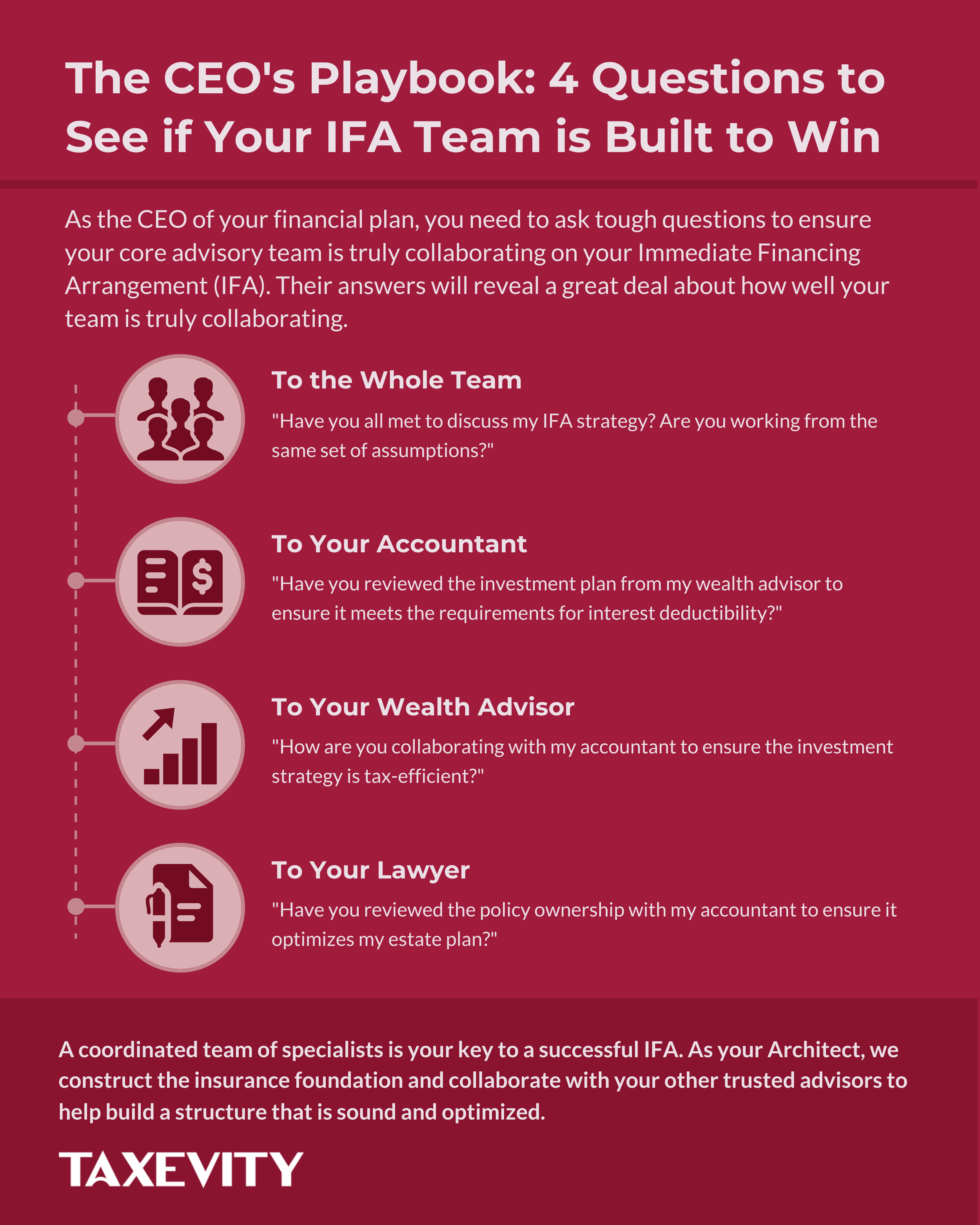(Part of the IFA Master Curriculum)
Key Question for Canadians
An Immediate Financing Arrangement (IFA) is a team sport, not a solo purchase. As the CEO of your financial plan, how do you ensure the independent advisors you rely on are truly working as a coordinated team to protect you from strategic risk?
- The Risk of Silos: Your entire strategy is at risk when your advisors work in silos. Investment assumptions may not align with the insurance structure, and the portfolio might not be defensible for tax purposes .
- Your Role as CEO: To ensure success, you must take on the role of CEO for your financial plan. Your job is to assemble and manage your Core Advisory Team, which includes the Architect (Insurance), Guardian (Accountant), Strategist (Wealth Advisor), and Advocate (Legal Counsel) .
- Your Integrator Playbook: Your team needs a designated Integrator to keep the process aligned and moving forward. As the CEO, your playbook is to ask tough questions to ensure every member of the team is communicating effectively and working from the same set of assumptions.
As a successful business owner, incorporated professional or individual, you understand the power of a great team. The same principle applies to your financial life, especially when implementing a sophisticated strategy like an Immediate Financing Arrangement (IFA).
An IFA is not a product you simply buy; it’s a complex process that requires a coordinated team of independent experts working in concert on your behalf. A breakdown in that teamwork can cost you dearly.
This guide is for you, the client. It will help you understand the roles on your team and empower you to ensure they are built to win. For a more detailed look at the team structure, you can read our foundational article, The IFA Core Advisory Team: A Requirement for Success.
Page Contents
The High Cost of a Disconnected Team
Are you the primary conduit of information between your advisors, relaying messages and forwarding documents back and forth? When it comes to an IFA, this lack of direct collaboration can be detrimental.
When your advisors work in silos:
- The insurance structure might be based on investment return assumptions your wealth advisor has never seen.
- The investment portfolio might be structured in a way that your accountant can’t defend for tax purposes.
- The legal ownership structure might not align with your estate planning goals.
In short, a disconnected team puts your entire strategy at risk.
Your Role: The CEO of Your Financial Plan
To ensure success, you must take on the role of CEO for your financial plan. Your job is to assemble and manage your Core Advisory Team, ensuring every member understands their role and communicates effectively.
Your team consists of four key specialists:
- The Architect (Insurance & Modeling Specialist): This is our role at Taxevity. We design the foundational insurance policy and create the sophisticated financial models that drive the strategy. To learn more, see The Arthitect’s Role on the IFA Core Advisory Team.
- The Guardian (Your Accountant): They protect you by ensuring the strategy is tax-compliant and that all financial assumptions are realistic. You can share our detailed guide with them: The Accountant’s Role on the IFA Core Advisory Team.
- The Strategist (Your Wealth Advisor): They design and manage the investment portfolio for the borrowed funds, balancing growth with critical tax rules. You can share our detailed guide with them: The Wealth Advisor’s Role on the IFA Core Advisory Team.
- The Advocate (Your Legal Counsel): They protect your interests by reviewing all contracts and ensuring the legal structure is sound. You can share our detailed guide with them: The Legal Advocate’s Role on the IFA Core Advisory Team.
The Integrator and A Note on Conflicts
Furthermore, your team needs a designated Integrator—a coordinator responsible for keeping the team aligned and the process moving forward. This role is often filled by your wealth advisor or accountant. However, if you have the time and project management skills, you may choose to take on this role yourself. The key is that someone must be formally responsible for coordination.
As you assemble your team, be aware of potential conflicts of interest. An advisor may have pre-existing relationships or forced to use an in-house person without the niche expertise required for a successful IFA. As the CEO of your plan, you have the right and responsibility to ensure that each role is filled by an independent specialist with deep, verifiable experience in this specific strategy.
Your Playbook: Questions to Ask Your Team

As the CEO, you need to ask tough questions to ensure your team is up to the task.
- To the whole team: “Have you all met to discuss my IFA strategy? Are you working from the same set of assumptions?”
- To your accountant: “Have you reviewed the investment plan from my wealth advisor to ensure it meets the requirements for interest deductibility?”
- To your wealth advisor: “How are you collaborating with my accountant to ensure the investment strategy is tax-efficient?”
- To your lawyer: “Have you reviewed the policy ownership with my accountant to ensure it optimizes my estate plan?”
Their answers will tell you a lot about how well your team is truly collaborating.
Conclusion: Build a Team That’s Built to Win
An IFA is a team sport. Winning requires more than just having good players; it requires a coordinated strategy and flawless execution. By taking on the role of CEO, you can ensure your advisory team is working as one cohesive unit to protect your interests and maximize your success.
At Taxevity, we are the Architect on your IFA team, and we thrive on collaborating with your other trusted advisors.
Is your team ready for an IFA? If you are exploring this strategy, contact us. We can help you and your advisors understand the process and our role in building a successful plan.





